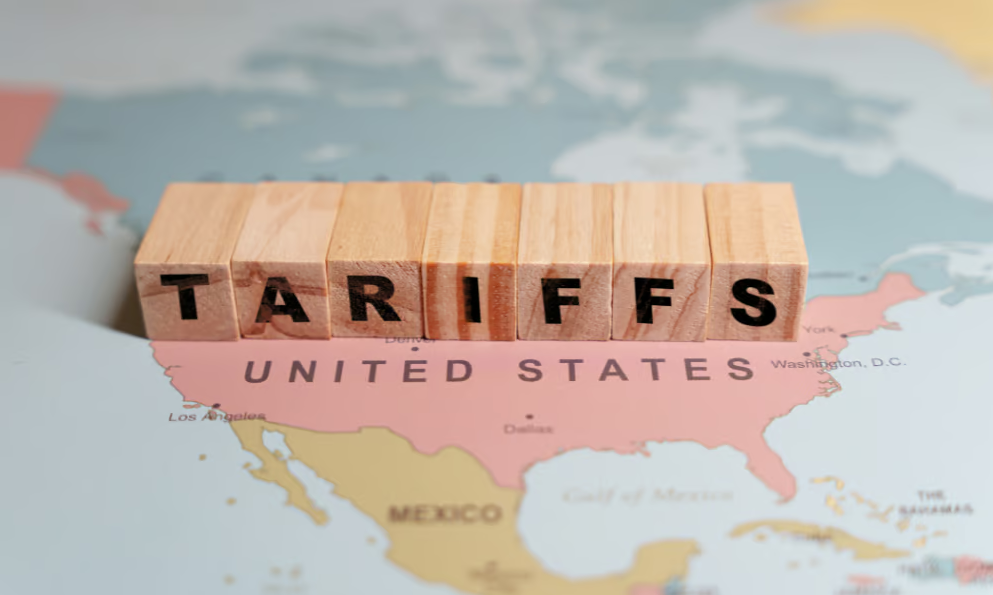

Wall Street suffered a sharp decline as President Donald Trump reaffirmed his commitment to imposing 25% tariffs on imports from Canada and Mexico, dashing investor hopes for a last-minute resolution. The move, which takes effect Tuesday, sent shockwaves through financial markets, exacerbating concerns about inflation and economic stability.
Trump, speaking from the White House alongside Commerce Secretary Howard Lutnick, made it clear that there would be no 11th-hour negotiations. “There’s no room left for Mexico or Canada,” he said. “Reciprocal tariffs begin immediately.”
The confirmation sent US stocks into a tailspin. The Dow Jones Industrial Average fell by 1.8%, shedding 789 points, while the Nasdaq Composite sank 3%, dragged down by steep losses in major tech firms. The S&P 500 also slipped 2.1%, turning negative for the year.
The impact rippled across industries, with automakers particularly hard-hit. General Motors and Ford saw their stock prices tumble, reflecting fears that the tariffs will disrupt North American supply chains. Semiconductor stocks also took a hit, with Nvidia, Broadcom, and Super Micro Computer all seeing steep declines.
Despite the turmoil in U.S. markets, European stocks moved in the opposite direction, buoyed by a rally in defense shares. The Stoxx Europe 600, the FTSE 100, and Germany’s DAX all surged to new highs, with companies like BAE Systemsand Thales seeing double-digit gains amid discussions of increased military spending.
Beyond the stock market, economic indicators painted a worrisome picture. New data released Monday showed a sharp increase in manufacturing input costs in February, with analysts attributing the rise to anticipation of higher import tariffs. With Canada accounting for about 60% of U.S. crude oil imports, businesses are bracing for further price pressures, particularly after Trump exempted Canadian energy products from the 25% tariff—opting instead for a 10% levy.
“Whether the market can withstand this level of uncertainty remains to be seen,” said Chris Rupkey, chief economist at FWDBONDS. “One way or another, these tariffs will be a shock for the economy.”
The decision to move forward with tariffs follows weeks of speculation. Trump had initially issued an executive order in February, setting the levies at 25%, with a brief delay granted after emergency negotiations with Mexican President Claudia Sheinbaum and Canadian Prime Minister Justin Trudeau. However, with no long-term agreement reached, the administration opted to push ahead with the measures.
Market analysts say the uncertainty surrounding the tariffs has already weighed on sentiment. February saw all three major U.S. stock indexes post losses, with the Nasdaq suffering its worst month since April 2024.
As investors digest the fallout, attention now shifts to upcoming economic data. The February jobs report, due Friday, will provide further clues about the state of the economy. In the meantime, businesses and policymakers alike are bracing for potential retaliatory measures from Canada and Mexico, which could further disrupt trade flows.
For now, with tariffs set to kick in within hours, financial markets remain on edge, and businesses are scrambling to adjust to an increasingly unpredictable economic landscape.

Blue Anchor Capital Management and Pickett also purchased “highly aggressive and volatile” securities, according to the order.

Reshuffle provides strong indication of where the regulator's priorities now lie.

Goldman Sachs Asset Management report reveals sharpened focus on annuities.

Ahead of Father's Day, InvestmentNews speaks with Andrew Crowell.

Cerulli research finds nearly two-thirds of active retirement plan participants are unadvised, opening a potential engagement opportunity.
Barely a decade old, registered index-linked annuities have quickly surged in popularity, thanks to their unique blend of protection and growth potential—an appealing option for investors looking to chart a steadier course through today’s choppy market waters, says Myles Lambert, Brighthouse Financial.
How intelliflo aims to solve advisors' top tech headaches—without sacrificing the personal touch clients crave
